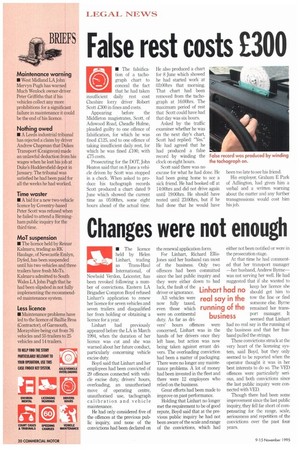Changes were not enough
Page 22

If you've noticed an error in this article please click here to report it so we can fix it.
• The licence held by Helen Linhart, trading as Trans-Haul International, of Newbold Verdon, Leicester, has been revoked following a number of convictions. Eastern LA Brigadier Compton Boyd refused Linhart's application to renew her licence for seven vehicles and seven trailers and disqualified her from holding or obtaining a licence for a year.
Linhart had previously appeared before the LA in March 1994, when the duration of her licence was cut and she was warned about her future conduct, particularly concerning vehicle excise duty.
Boyd said that Linhart and her employees had been convicted of 29 offences connected with vehicle excise duty drivers' hours, overloading, an unauthorised move of operating centre, unauthorised use, tachograph calibration and vehicle maintenance.
He had only considered five of the offences at the previous public inquiry and none of the convictions had been declared on the renewal application form.
For Linhart, Richard EllisJones said her husband ran most of the business. Only two offences had been committed since the last public inquiry and they were either down to bad luck, the fault of the driver or ignorance.
All vehicles were now fully taxed, even those which were on continental duty As far as drivers' hours offences were concerned, Linhart was in the hands of her drivers once they left base, but action was now being taken against errant drivers. The overloading conviction had been a matter of packaging. There were no longer any maintenance problems. A lot of money had been invested in the fleet and there were 12 employees who relied on the business.
Great efforts had been made to improve on past performance.
Holding that Linhart no longer met the requirement to be of good repute, Boyd said that at the previous public inquiry he had not been aware of the scale and range of the convictions, which had either not been notified or were in the prosecution stage.
At that time he had commented that her transport manager —her husband, Andrew Byrne— was not serving her well. He had suggested that if she wanted to keep her licence she should get him to tow the line or find someone else. Byrne remained her transport manager. It seemed that Linhart had no real say in the running of the business and that her husband pulled the strings.
These convictions struck at the very heart of the licensing system, said Boyd, but they only seemed to be reported when the operator thought it was in her best interests to do so. The VED offences were particularly serious, and both convictions since the last public inquiry were connected with VED.
Though there had been some improvement since the last public inquiry, they fell far short of compensating for the range, scale, seriousness and repetition of the convictions over the past four years.




















































































































